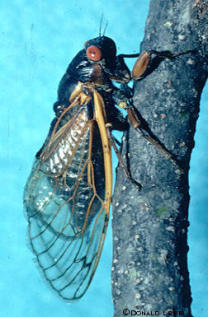AMES, Iowa – An Iowa State University entomologist is encouraging central Iowans to enjoy their front-row seats as countless periodical cicadas emerge from the ground to blanket wooded areas, an event that occurs once every 17 years.
“People should be ready to get out to see and hear this to the maximum extent possible,” said Donald Lewis, a professor of entomology at Iowa State University.
Lewis said the first reports of cicada sightings trickled in from southern Iowa on Thursday, and hot weather in the forecast means that cicada activity likely will pick up steam quickly, he said.
Up to 1.5 million cicadas can crowd into a single acre of woodland and up to 40,000 in a single tree, a spectacle made even more impressive by the distinctive buzzing sound the insects create.
Most of the bugs will appear in the southeastern half of Iowa and into Missouri and parts of western Illinois. They’ll stick around for about six weeks – long enough for the adult cicadas to mate, lay eggs and die. When the eggs hatch, the offspring burrow into the ground where they feed on the sap from tree roots. Seventeen years later, the nymph cicadas will emerge as adults and start the whole process over again.
The insects that will emerge this summer are the offspring of cicadas that emerged in 1997.
Lewis said the unique lifecycle of the cicadas is most likely an adaptation to outsmart potential predators.
“The cicadas wait a long time to reappear, and, when they do, they are synchronized to appear in mass numbers all at once,” he said. “That beats any predator that would want to make a livelihood of eating periodical cicadas.”
Lewis urged Iowans to take the opportunity to observe one of nature’s wildest displays. Aside from the incessant buzzing – produced by two shell-like drums located along the sides of the abdomen of male cicadas – the insects are harmless, he said.
“They do not damage crops or gardens,” Lewis said. “They don’t bite. They can’t sting. They don’t attack your house or your possessions.”
Lewis warned that the carcasses left behind after the cicadas die can leave an unpleasant stench, and some people feel overwhelmed by the sheer number of cicadas that emerge.
Beyond that, it’s a party Iowans shouldn’t miss, Lewis said. And anyone who skips this year will have to wait until 2031 for another chance.
